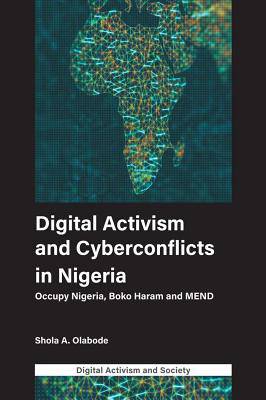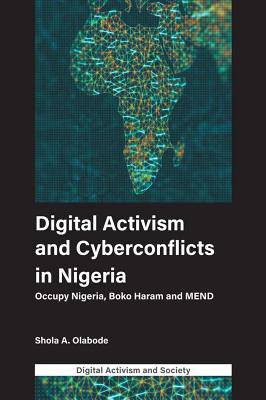
- Afhalen na 1 uur in een winkel met voorraad
- Gratis thuislevering in België vanaf € 30
- Ruim aanbod met 7 miljoen producten
- Afhalen na 1 uur in een winkel met voorraad
- Gratis thuislevering in België vanaf € 30
- Ruim aanbod met 7 miljoen producten
Zoeken
€ 190,45
+ 380 punten
Omschrijving
This book offers an innovative contribution to the literature on digital activism and cyberconflicts. Analysing sociopolitical and ethnoreligious conflicts within an African-centred context, the author uses Nigeria as a lens to understand the digital and organisational aspects of digital media uses in the Occupy Nigeria movement protest, the Boko Haram conflict and The Movement for the Emancipation of the Niger Delta (MEND) conflict.
Timely, in a period of intense conflict across the globe, the author employs an interdisciplinary approach, drawing on the Cyberconflict Framework to examine conflicts emerging in computer-mediated environments.
Examining the implications for socio-political and economic reform and change, the cases explored provide a snapshot of the emerging digital culture of conflict. The book contributes to existing knowledge by bridging the gap in the literature on digital activism and conflict as a field of study.
Timely, in a period of intense conflict across the globe, the author employs an interdisciplinary approach, drawing on the Cyberconflict Framework to examine conflicts emerging in computer-mediated environments.
Examining the implications for socio-political and economic reform and change, the cases explored provide a snapshot of the emerging digital culture of conflict. The book contributes to existing knowledge by bridging the gap in the literature on digital activism and conflict as a field of study.
Specificaties
Betrokkenen
- Auteur(s):
- Uitgeverij:
Inhoud
- Aantal bladzijden:
- 272
- Taal:
- Engels
- Reeks:
Eigenschappen
- Productcode (EAN):
- 9781787560154
- Verschijningsdatum:
- 24/10/2018
- Uitvoering:
- Hardcover
- Formaat:
- Genaaid
- Afmetingen:
- 157 mm x 231 mm
- Gewicht:
- 385 g

Alleen bij Standaard Boekhandel
+ 380 punten op je klantenkaart van Standaard Boekhandel
Beoordelingen
We publiceren alleen reviews die voldoen aan de voorwaarden voor reviews. Bekijk onze voorwaarden voor reviews.











